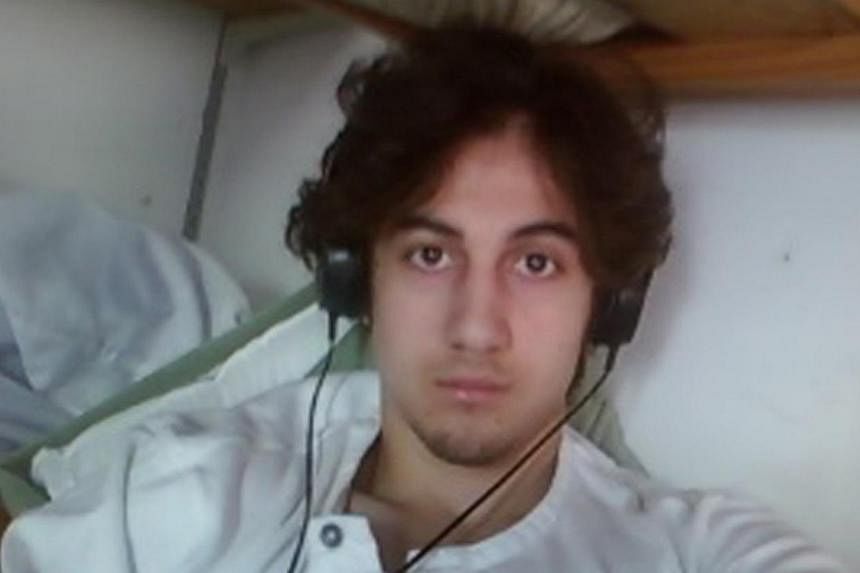BOSTON (AFP) - The brother and stepfather of the policeman shot dead by the Boston bombers gave harrowing, tear-jerking testimony Wednesday as convicted killer Dzhokhar Tsarnaev sat emotionless in court.
The 21-year-old former university student will be sentenced either to death or to life in prison without parole by a jury after the second phase of his trial, now under way in the northeastern US city.
Sean Collier, 27, was campus police officer at the Massachusetts Institute of Technology, one of the most prestigious universities in the United States, when the Tsarnaev brothers shot him dead in his car on the night of April 18, 2013.
"It's been a terrible two years," stepfather Joseph Rogers, 58, told the court. He married Collier's mother more than 20 years ago, and the blended family grew up together, six children in all.
One woman on the jury cried as Rogers told of the phone call announcing that Sean had been shot and the rush to the hospital.
"All the children showed up," he said. Rogers and his wife saw Sean's bloodied body in a hospital room.
"He had a hole in the middle of the head, he was shot to pieces."
Tsarnaev, dressed in a brown blazer and white shirt, refused to look at Rogers, maintaining the impervious expression that he has adopted since his federal trial began in early March.
Instead, he looked at the ground or straight in front, sometimes fondling his goatee beard or touching his hair.
"There is somebody missing. Thanksgiving and Christmas will never be the same," said Rogers.
'HUGE LOSS'
"It is still a huge loss for me and my family for the rest of our lives," Sean's younger brother Andrew Collier told the court.
"I miss everything about him," he said, telling of the generosity of spirit and sense of duty of a brother who jad wanted to be a policeman for as long as he could remember.
"He was a moral compass," Andrew said.
Prosecutors showed the jury photographs of Sean with Andrew in their pajamas holding teddy bears as children, at family gatherings such as his sister's wedding and in his police car.
Tsarnaev was convicted on April 8 on all 30 counts related to the April 15, 2013 Boston Marathon bombings, Collier's murder, a carjacking and a shootout while he was on the run.
The killer of part Chechen descent who moved to America with his family aged eight took US nationality a year before carrying out the bombings, which killed three and wounded 264 more.
He carried out the attacks with his older brother Tamerlan, who was shot dead by police while the pair were on the run.
On Wednesday, the head of MIT police, John DiFava, also testified about the respect he had for Sean Collier and his "strength of character" and said "grief has not gone away."
"Sometimes I wonder if I want to continue (in the police)," he said.
HARROWING PHOTOS
Bombing survivor Eric Walley, 67, recounted the operations that he had to undergo after being wounded. Photographs of his injuries were shown to the jury.
On Tuesday, prosecutors told the start of the penalty phase that Tsarnaev was "America's worst nightmare" who deserves to die for perpetrating one of the bloodiest attacks on US soil since 9/11.
The court was shown a never before seen photograph of Tsarnaev, dressed in an orange prison jumpsuit flipping his middle finger at a surveillance camera in a cell before his first arraignment.
"This is Dzhokhar Tsarnaev, unconcerned, unrepentant and unchanged," said Assistant US Attorney Nadine Pellegrini.
The sentencing phase could last up to four weeks.
Prosecutors will try to convince the 12 jurors that there are enough aggravating factors - including premeditation, the number of victims and a lack of remorse - to warrant capital punishment.
Defence attorneys will follow the prosecution in calling witnesses, possibly sometime next week.
They will call for life without parole, portraying Tsarnaev as a confused 19-year-old, frightened of his more radical, older brother.
Jurors were selected in part for their openness to imposing the death penalty, controversial in a state that has executed no one since 1947 and where Catholic bishops oppose capital punishment.
A poll carried out by CNN found that just over half of Americans, 53 per cent, said Tsarnaev should get the death penalty.

